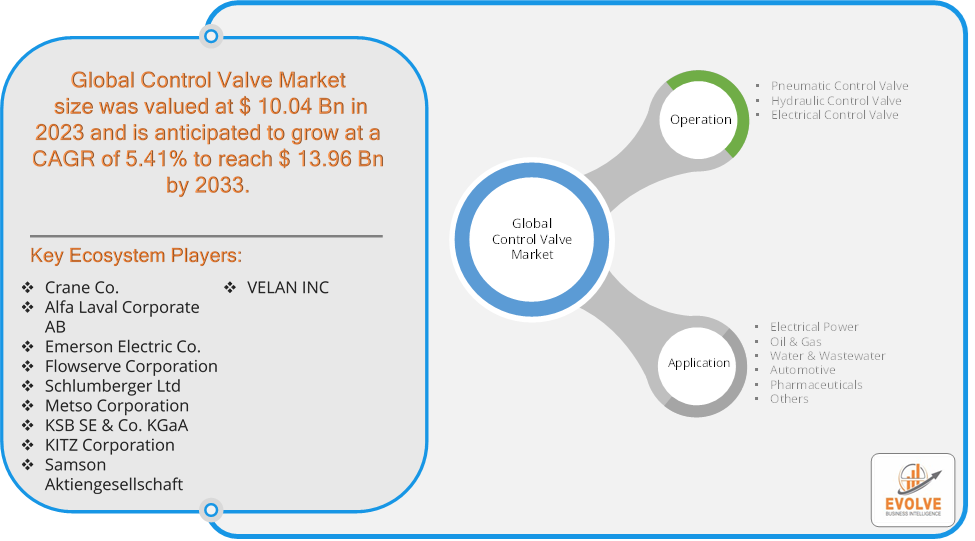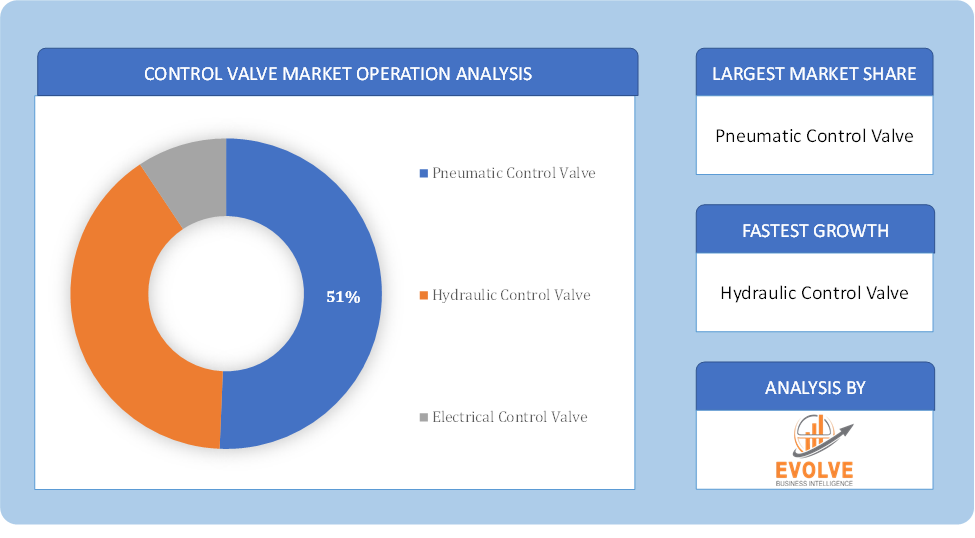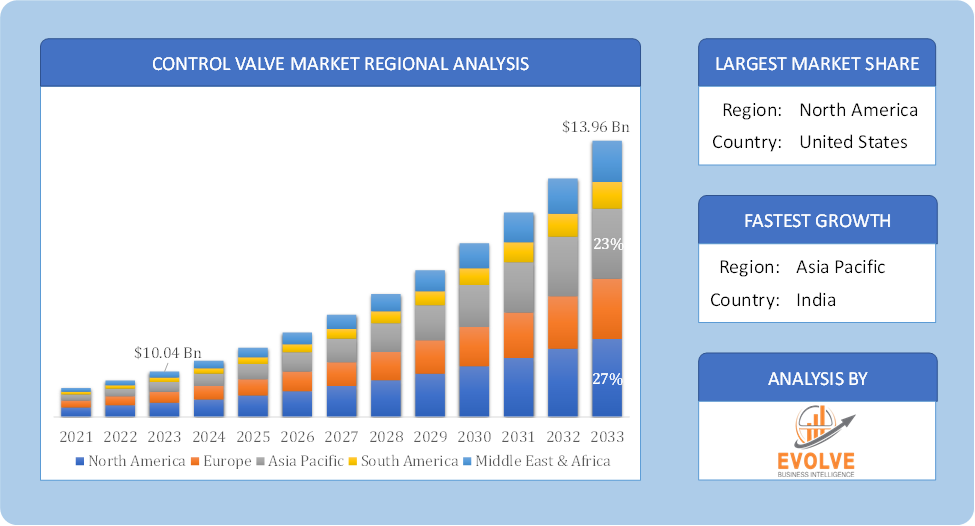Control Valve Market Analysis and Global Forecast 2023-2033
$ 1,390.00 – $ 5,520.00Price range: $ 1,390.00 through $ 5,520.00
Control Valve Market Research Report: Information By Operation (Pneumatic Control Valve, Hydraulic Control Valve, Electrical Control Valve), By Application (Electrical Power, Oil & Gas, Water & Wastewater, Automotive, Pharmaceuticals, Others), and by Region — Forecast till 2033
Page: 140
Control Valve Market Overview
The Control Valve Market Size is expected to reach USD 13.96 Billion by 2033. The Control Valve industry size accounted for USD 10.04 Billion in 2023 and is expected to expand at a compound annual growth rate (CAGR) of 5.41% from 2023 to 2033. The control valve market involves the production and sale of devices used to regulate fluid flow, pressure, temperature, or liquid levels in various industries. Control valves are crucial in sectors like oil & gas, water management, pharmaceuticals, and power generation. The market is driven by the increasing demand for automation in industrial processes, technological advancements, and the need for energy-efficient systems. Key types include globe valves, ball valves, butterfly valves, and others, with applications ranging from simple to complex systems.
Global Control Valve Market Synopsis
 Control Valve Market Dynamics
Control Valve Market Dynamics
The major factors that have impacted the growth of Control Valve are as follows:
Drivers:
Ø Technological Advancements
Innovations in control valve design, materials, and automation technology are enhancing the performance, reliability, and lifespan of these products. Smart valves with integrated sensors and IoT capabilities enable real-time monitoring and predictive maintenance, further boosting their adoption.
Restraint:
- Skilled Labor Shortage
The operation, installation, and maintenance of control valves require specialized skills and knowledge. A shortage of skilled labor, particularly in developing regions, can pose a significant challenge. The lack of trained personnel can lead to improper installation, inefficient operation, and increased maintenance costs, negatively impacting the overall performance of control valve systems.
Opportunity:
⮚ Innovation in Materials and Design
Advances in materials science and valve design offer opportunities for creating more durable, reliable, and efficient control valves. The development of corrosion-resistant materials, high-performance alloys, and advanced sealing technologies can enhance the performance and lifespan of control valves, especially in harsh environments. Innovation in valve design, including modular and customizable solutions, can also cater to specific industry needs and applications.
Control Valve Segment Overview
Based on Operation, the market is segmented based on Pneumatic Control Valve, Hydraulic Control Valve, Electrical Control Valve. Pneumatic Control Valves often dominate due to their widespread use in various industries for their reliability, fast response times, and ease of maintenance.
By Application
Based on Applications, the market has been divided into the Electrical Power, Oil & Gas, Water & Wastewater, Automotive, Pharmaceuticals, Others. the Oil & Gas sector typically dominates, driven by its extensive use in managing fluid flow, pressure, and temperature in exploration, production, and refining processes.
Global Control Valve Market Regional Analysis
Based on region, the global Control Valve market has been divided into North America, Europe, Asia-Pacific, the Middle East & Africa, and Latin America. North America is projected to dominate the use of the Control Valve market followed by the Asia-Pacific and Europe regions.
 Control Valve North America Market
Control Valve North America Market
North America holds a dominant position in the Control Valve Market. In North America, the control valve market is driven by the region’s robust industrial base, including sectors like oil & gas, power generation, and water treatment. The demand for advanced automation and energy-efficient solutions fuels market growth. Regulatory standards and a focus on sustainability further boost the adoption of high-performance control valves. Additionally, ongoing infrastructure projects and technological innovations contribute to a strong market presence in this region.
Control Valve Asia-Pacific Market
The Asia-Pacific region has indeed emerged as the fastest-growing market for the Control Valve industry. In the Asia-Pacific region, the control valve market is experiencing significant growth due to rapid industrialization and infrastructure development. Key sectors driving demand include oil & gas, water treatment, and power generation. The region’s expanding manufacturing base and increasing adoption of automation technologies further enhance market opportunities. Additionally, growing investments in energy efficiency and sustainable practices contribute to the rising demand for advanced control valve solutions.
Competitive Landscape
The global Control Valve market is highly competitive, with numerous players offering a wide range of software solutions. The competitive landscape is characterized by the presence of established companies, as well as emerging startups and niche players. To increase their market position and attract a wide consumer base, the businesses are employing various strategies, such as Operation launches, and strategic alliances.
Prominent Players:
- Crane Co.
- Alfa Laval Corporate AB
- Emerson Electric Co.
- Flowserve Corporation
- Schlumberger Ltd
- Metso Corporation
- KSB SE & Co. KGaA
- KITZ Corporation
- Samson Aktiengesellschaft
- VELAN INC
Key Development
Emerson Electric Co has been an important player in the Control Valve Industry. The fact that it has recently introduced some new products with many useful manufacturing applications has cemented its leading market position. Some of these new products are Fisher, Crosby, and Kunkle.
Scope of the Report
Global Control Valve Market, by Operation
- Pneumatic Control Valve
- Hydraulic Control Valve
- Electrical Control Valve
Global Control Valve Market, by Application
- Electrical Power
- Oil & Gas
- Water & Wastewater
- Automotive
- Pharmaceuticals
- Others
Global Control Valve Market, by Region
- North America
- US
- Canada
- Mexico
- Europe
- UK
- Germany
- France
- Italy
- Spain
- Benelux
- Nordic
- Rest of Europe
- Asia Pacific
- China
- Japan
- South Korea
- Indonesia
- Austalia
- Malaysia
- India
- Rest of Asia Pacific
- South America
- Brazil
- Argentina
- Rest of South America
- Middle East & Africa
- Saudi Arabia
- UAE
- Egypt
- South Africa
- Rest of Middle East & Africa
| Parameters | Indicators |
|---|---|
| Market Size | 2033: USD 13.96 Billion |
| CAGR (2023-2033) | 5.41% |
| Base year | 2022 |
| Forecast Period | 2023-2033 |
| Historical Data | 2021 (2017 to 2020 On Demand) |
| Report Coverage | Revenue Forecast, Competitive Landscape, Growth Factors, and Trends |
| Key Segmentations | Operation, Application |
| Geographies Covered | North America, Europe, Asia-Pacific, South America, Middle East, Africa |
| Key Vendors | Crane Co., Alfa Laval Corporate AB, Emerson Electric Co., Flowserve Corporation, Schlumberger Ltd, Metso Corporation, KSB SE & Co. KGaA, KITZ Corporation, Samson Aktiengesellschaft, VELAN INC. |
| Key Market Opportunities | · The growing demand for healthier food options · The increased automation of many basic and more complex manufacturing tasks and processes |
| Key Market Drivers | · Increasing investments in water & wastewater industry Construction and upscale of nuclear power plants |
REPORT CONTENT BRIEF:
- High-level analysis of the current and future Control Valve market trends and opportunities
- Detailed analysis of current market drivers, restraining factors, and opportunities in the future
- Control Valve market historical market size for the year 2021, and forecast from 2023 to 2033
- Control Valve market share analysis at each Operation level
- Competitor analysis with detailed insight into its Operation segment, Government & Defense strength, and strategies adopted.
- Identifies key strategies adopted including Operation launches and developments, mergers and acquisitions, joint ventures, collaborations, and partnerships as well as funding taken and investment done, among others.
- To identify and understand the various factors involved in the global Control Valve market affected by the pandemic
- To provide a detailed insight into the major companies operating in the market. The profiling will include the Government & Defense health of the company’s past 2-3 years with segmental and regional revenue breakup, Operation offering, recent developments, SWOT analysis, and key strategies.
Frequently Asked Questions (FAQ)
What is the study period of this market?
The study period of the global Control Valve market is 2021- 2033
What is the growth rate of the global Control Valve market?
The global Control Valve market is growing at a CAGR of 5.41% over the next 10 years
Which region has the highest growth rate in the market of Control Valve?
Asia Pacific is expected to register the highest CAGR during 2023-2033
Which region has the largest share of the global Control Valve market?
North America holds the largest share in 2022
Who are the key players in the global Control Valve market?
Crane Co., Alfa Laval Corporate AB, Emerson Electric Co., Flowserve Corporation, Schlumberger Ltd, Metso Corporation, KSB SE & Co. KGaA, KITZ Corporation, Samson Aktiengesellschaft, and VELAN INC are the major companies operating in the market.
Do you offer Post Sale Support?
Yes, we offer 16 hours of analyst support to solve the queries
Do you sell particular sections of a report?
Yes, we provide regional as well as country-level reports. Other than this we also provide a sectional report. Please get in contact with our sales representatives.
Press Release

Global Pharmaceutical Manufacturing Market to Reach $1.38 Trillion by 2035 with 7.35% CAGR, New Research Shows

The Global Mammography Market Is Estimated To Record a CAGR of Around 10.29% During The Forecast Period

Glue Stick Market to Reach USD 2.35 Billion by 2034

Podiatry Service Market to Reach USD 11.88 Billion by 2034

Microfluidics Technology Market to Reach USD 32.58 Billion by 2034

Ferric Chloride Market to Reach USD 10.65 Billion by 2034

Family Practice EMR Software Market to Reach USD 21.52 Billion by 2034

Electric Hairbrush Market to Reach USD 15.95 Billion by 2034

Daily Bamboo Products Market to Reach USD 143.52 Billion by 2034

Cross-border E-commerce Logistics Market to Reach USD 112.65 Billion by 2034
Table of Content
Chapter 1. Executive Summary Chapter 2. Scope Of The Study 2.1. Market Definition 2.2. Scope Of The Study 2.2.1. Objectives of Report 2.2.2. Limitations 2.3. Market Structure Chapter 3. Evolve BI Methodology Chapter 4. Market Insights and Trends 4.1. Supply/ Value Chain Analysis 4.1.1. Raw Applications Providers 4.1.2. Manufacturing Process 4.1.3. Distributors/Retailers 4.1.4. End-Use Industry 4.2. Porter’s Five Forces Analysis 4.2.1. Threat Of New Entrants 4.2.2. Bargaining Power Of Buyers 4.2.3. Bargaining Power Of Suppliers 4.2.4. Threat Of Substitutes 4.2.5. Industry Rivalry 4.3. Impact Of COVID-19 on the Control Valve Market 4.3.1. Impact on Market Size 4.3.2. End-Use Industry Trend, Preferences, and Budget Impact 4.3.3. Regulatory Framework/Government Policies 4.3.4. Key Players' Strategy to Tackle Negative Impact 4.3.5. Opportunity Window 4.4. Technology Overview 12.28. Macro factor 4.6. Micro Factor 4.7. Demand Supply Gap Analysis of the Control Valve Market 4.8. Import Analysis of the Control Valve Market 4.9. Export Analysis of the Control Valve Market Chapter 5. Market Dynamics 5.1. Introduction 5.2. DROC Analysis 5.2.1. Drivers 5.2.2. Restraints 5.2.3. Opportunities 5.2.4. Challenges 5.3. Patent Analysis 5.4. Industry Roadmap 5.5. Parent/Peer Market Analysis Chapter 6. Global Control Valve Market, By Operation 6.1. Introduction 6.2. Pneumatic Control Valve 6.3. Hydraulic Control Valve 6.4. Electrical Control Valve Chapter 7. Global Control Valve Market, By Application 7.1. Introduction 7.2. Electrical Power 7.3. Oil & Gas 7.4. Water & Wastewater 7.5. Automotive 7.6. Pharmaceuticals OthersChapter 8. Global Control Valve Market, By Region 8.1. Introduction 8.2. North America 8.2.1. Introduction 8.2.2. Driving Factors, Opportunity Analyzed, and Key Trends 8.2.3. Market Size and Forecast, By Country, 2023-2033 8.2.4. Market Size and Forecast, By Operation, 2023-2033 8.2.5. Market Size and Forecast, By Application, 2023-2033 8.2.6. US 8.2.6.1. Introduction 8.2.6.2. Driving Factors, Opportunity Analyzed, and Key Trends 8.2.6.3. Market Size and Forecast, By Operation, 2023-2033 8.2.6.4. Market Size and Forecast, By Application, 2023-2033 8.2.7. Canada 8.2.7.1. Introduction 8.2.7.2. Driving Factors, Opportunity Analyzed, and Key Trends 8.2.7.4. Market Size and Forecast, By Operation, 2023-2033 8.2.7.5. Market Size and Forecast, By Application, 2023-2033 8.3. Europe 8.3.1. Introduction 8.3.2. Driving Factors, Opportunity Analyzed, and Key Trends 8.3.3. Market Size and Forecast, By Country, 2023-2033 8.3.4. Market Size and Forecast, By Operation, 2023-2033 8.3.5. Market Size and Forecast, By Application, 2023-2033 8.3.6. Germany 8.3.6.1. Introduction 8.3.6.2. Driving Factors, Opportunity Analyzed, and Key Trends 8.3.6.3. Market Size and Forecast, By Operation, 2023-2033 8.3.6.4. Market Size and Forecast, By Application, 2023-2033 8.3.7. France 8.3.7.1. Introduction 8.3.7.2. Driving Factors, Opportunity Analyzed, and Key Trends 8.3.7.3. Market Size and Forecast, By Operation, 2023-2033 8.3.7.4. Market Size and Forecast, By Application, 2023-2033 8.3.8. UK 8.3.8.1. Introduction 8.3.8.2. Driving Factors, Opportunity Analyzed, and Key Trends 8.3.8.3. Market Size and Forecast, By Operation, 2023-2033 8.3.8.4. Market Size and Forecast, By Application, 2023-2033 8.3.9. Italy 8.3.9.1. Introduction 8.3.9.2. Driving Factors, Opportunity Analyzed, and Key Trends 8.3.9.3. Market Size and Forecast, By Operation, 2023-2033 8.3.9.4. Market Size and Forecast, By Application, 2023-2033 8.3.11. Rest Of Europe 8.3.11.1. Introduction 8.3.11.2. Driving Factors, Opportunity Analyzed, and Key Trends 8.3.11.3. Market Size and Forecast, By Operation, 2023-2033 8.3.11.4. Market Size and Forecast, By Application, 2023-2033 8.4. Asia-Pacific 8.4.1. Introduction 8.4.2. Driving Factors, Opportunity Analyzed, and Key Trends 8.4.3. Market Size and Forecast, By Country, 2023-2033 8.4.4. Market Size and Forecast, By Operation, 2023-2033 8.12.28. Market Size and Forecast, By Application, 2023-2033 8.4.6. China 8.4.6.1. Introduction 8.4.6.2. Driving Factors, Opportunity Analyzed, and Key Trends 8.4.6.3. Market Size and Forecast, By Operation, 2023-2033 8.4.6.4. Market Size and Forecast, By Application, 2023-2033 8.4.7. India 8.4.7.1. Introduction 8.4.7.2. Driving Factors, Opportunity Analyzed, and Key Trends 8.4.7.3. Market Size and Forecast, By Operation, 2023-2033 8.4.7.4. Market Size and Forecast, By Application, 2023-2033 8.4.8. Japan 8.4.8.1. Introduction 8.4.8.2. Driving Factors, Opportunity Analyzed, and Key Trends 8.4.8.3. Market Size and Forecast, By Operation, 2023-2033 8.4.8.4. Market Size and Forecast, By Application, 2023-2033 8.4.9. South Korea 8.4.9.1. Introduction 8.4.9.2. Driving Factors, Opportunity Analyzed, and Key Trends 8.4.9.3. Market Size and Forecast, By Operation, 2023-2033 8.4.9.4. Market Size and Forecast, By Application, 2023-2033 8.4.10. Rest Of Asia-Pacific 8.4.10.1. Introduction 8.4.10.2. Driving Factors, Opportunity Analyzed, and Key Trends 8.4.10.3. Market Size and Forecast, By Operation, 2023-2033 8.4.10.4. Market Size and Forecast, By Application, 2023-2033 8.5. Rest Of The World (RoW) 8.5.1. Introduction 8.5.2. Driving Factors, Opportunity Analyzed, and Key Trends 8.5.3. Market Size and Forecast, By Operation, 2023-2033 8.5.4. Market Size and Forecast, By Application, 2023-2033 Chapter 9. Company Landscape 9.1. Introduction 9.2. Vendor Share Analysis 9.3. Key Development Analysis 9.4. Competitor Dashboard Chapter 10. Company Profiles 10.1. Crane Co. 10.1.1. Business Overview 10.1.2. Government & Defense Analysis 10.1.2.1. Government & Defense – Existing/Funding 10.1.3. OperationPortfolio 10.1.4. Recent Development and Strategies Adopted 10.1.5. SWOT Analysis 10.2. Alfa Laval Corporate AB 10.2.1. Business Overview 10.2.2. Government & Defense Analysis 10.2.2.1. Government & Defense – Existing/Funding 10.2.3. OperationPortfolio 10.2.4. Recent Development and Strategies Adopted 10.2.5. SWOT Analysis 10.3. Emerson Electric Co. 10.3.1. Business Overview 10.3.2. Government & Defense Analysis 10.3.2.1. Government & Defense – Existing/Funding 10.3.3. OperationPortfolio 10.3.4. Recent Development and Strategies Adopted 10.3.5. SWOT Analysis 10.4. Flowserve Corporation 10.4.1. Business Overview 10.4.2. Government & Defense Analysis 10.4.2.1. Government & Defense – Existing/Funding 10.4.3. OperationPortfolio 10.4.4. Recent Development and Strategies Adopted 10.12.28. SWOT Analysis 10.5. Schlumberger Ltd 10.5.1. Business Overview 10.5.2. Government & Defense Analysis 10.5.2.1. Government & Defense – Existing/Funding 10.5.3. OperationPortfolio 10.5.4. Recent Development and Strategies Adopted 10.5.5. SWOT Analysis 10.6. Metso Corporation 10.6.1. Business Overview 10.6.2. Government & Defense Analysis 10.6.2.1. Government & Defense – Existing/Funding 10.6.3. OperationPortfolio 10.6.4. Recent Development and Strategies Adopted 10.6.5. SWOT Analysis 10.7. KSB SE & Co. KGaA 10.7.1. Business Overview 10.7.2. Government & Defense Analysis 10.7.2.1. Government & Defense – Existing/Funding 10.7.3. OperationPortfolio 10.7.4. Recent Development and Strategies Adopted 10.7.5. SWOT Analysis 10.8 KITZ Corporation 10.8.1. Business Overview 10.8.2. Government & Defense Analysis 10.8.2.1. Government & Defense – Existing/Funding 10.8.3. OperationPortfolio 10.8.4. Recent Development and Strategies Adopted 10.8.5. SWOT Analysis 10.9 Samson Aktiengesellschaft 10.9.1. Business Overview 10.9.2. Government & Defense Analysis 10.9.2.1. Government & Defense – Existing/Funding 10.9.3. OperationPortfolio 10.9.4. Recent Development and Strategies Adopted 10.9.5. SWOT Analysis 10.10. VELAN INC 10.10.1. Business Overview 10.10.2. Government & Defense Analysis 10.10.2.1. Government & Defense – Existing/Funding 10.10.3. OperationPortfolio 10.10.4. Recent Development and Strategies Adopted 10.10.5. SWOT Analysis
Connect to Analyst
Research Methodology









